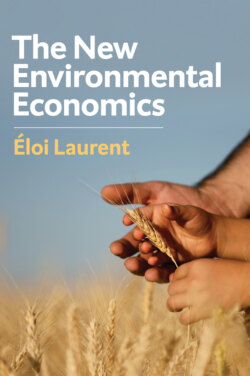Читать книгу The New Environmental Economics - Eloi Laurent - Страница 19
Human evolution toward planetary dominance: The small household and the bigger one
ОглавлениеIn his Mediterranean and the Mediterranean World in the Age of Philip II, French historian Fernand Braudel makes the hypothesis that the long geographical duration, which captures an almost immobile history (that of humans in their relations with the environment which surrounds them), can be set apart from the social time (economic and social cycles) and individual time (personal history). Because human development has accelerated so much during the twentieth century, we distinguish less and less clearly these three time horizons (geographical, social, and individual). We must now understand their contiguity, their correspondences, their interweaving. The story of humanity’s relationship with its environment has turned from a quiet lake into a tumultuous waterfall.
John Muir, who was instrumental in the creation of the first national parks in the United States in the 1870s and 1880s, said that when he wanted to know the news, he would go to the mountains. He meant to signify to his contemporaries that nothing was really new in their modernity and that only the contemplation of Nature brought to his soul a real regeneration. Today, our news is actually in the mountains: It is on the skin of sorrows of glaciers that we can read our future (in the Alps, the glacier surfaces have shrunk by half between 1900 and 2012).
Let us take stock of this acceleration of ecological time and the confusion of human and natural history. Earth was created 4.5 billion years ago. Life on Earth appeared 3.5 billion years ago. Manlike creatures first walked the face of the Earth seven million years ago. Homo sapiens sapiens emerged in 200,000 BCE. Already, we can see how late humans arrive in the biosphere picture. But then things start to really accelerate: Agriculture is developed around 10,000 BCE, industrial revolution is, so to speak, in full steam around 1850 CE, industrial growth kicks in 1950 CE and becomes global in 1990 (with the development of China and India). To put things in perspective, in a mere one hundred years, humans have become completely dominant on a planet that started its own evolution several billions of years before them.
Hence we get the idea of the Anthropocene, combining humanity and geology, a time when “the global effects of human activities have become clearly noticeable” (Crutzen and Stoermer, 2000).3 In the social-ecological approach of this book, we can more precisely define the Anthropocene as an age where social systems rule natural systems and are affected back by the dynamics they set in motion. To put it differently, the domination of human societies of the biosphere has not ended their dependence on the biosphere. This is what Vitousek and his colleagues meant when they wrote more than twenty years ago with profound wisdom supported by groundbreaking data: “It is clear that we control much of Earth, and that our activities affect the rest. In a very real sense, the world is in our hands – and how we handle it will determine its composition and dynamics, and our fate.”4
